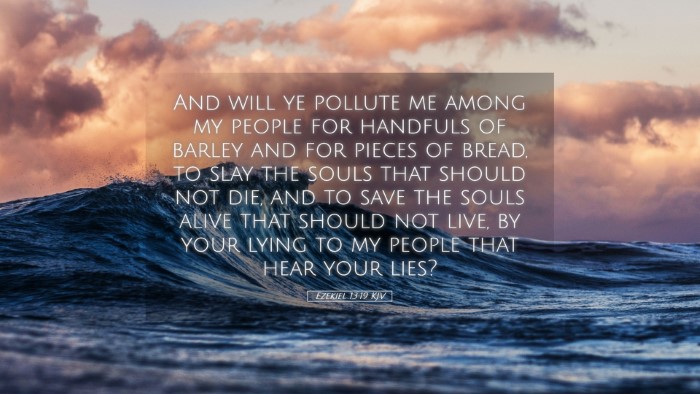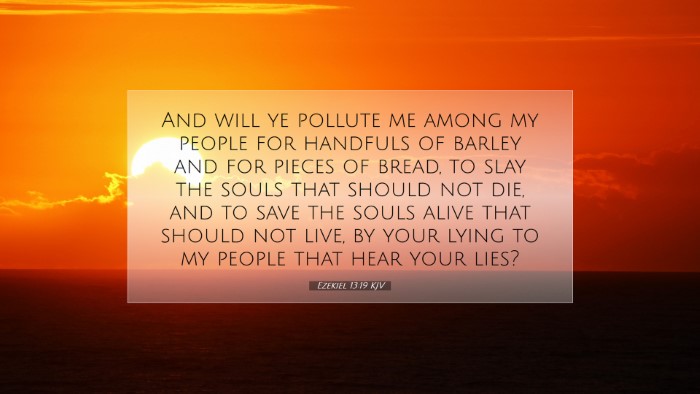Bible Commentary on Ezekiel 13:19
Ezekiel 13:19 (KJV): "And will ye pollute me among my people for handfuls of barley and for pieces of bread, to slay the souls that should not die, and to save the souls alive that should not live, by your lying to my people that hear your lies?"
Introduction
This verse from the book of Ezekiel captures a significant moment in the prophet's condemnation of false prophets. The intersection of social injustice, spiritual deception, and divine accountability is richly woven into this text. The narrative reveals God's displeasure with prophets who exploit the vulnerable for personal gain while jeopardizing the lives and souls of those they purport to guide.
Contextual Background
Ezekiel, a priest and prophet, speaks during a turbulent time in Israel's history when the nation is facing impending judgment for its idolatry and wickedness. Chapter 13 specifically addresses the false prophets in Israel, contrasting their misleading messages with the true word of God. This verse serves as a poignant critique of their actions, especially in light of their motivations.
Analysis of Key Phrases
Pollute me among my people
Here, God identifies the act of misleading His people as a form of pollution. False prophets defile the sanctity of God’s presence and His word through their deceitfulness. This action signifies a serious transgression against God, who demands purity from His people.
Handfuls of barley and pieces of bread
This phrase illustrates the triviality of the bribery that motivates the false prophets' actions. For mere sustenance, they are willing to forsake their duty to God and harm the spiritual welfare of the people. It underscores humanity’s propensity to sell its integrity for selfish gain.
Slay the souls that should not die
These words emphasize the gravity of the false prophets' influence. Their misleading counsel doesn’t merely lead to physical repercussions; it jeopardizes the eternal state of the souls they mislead. There is a divine threshold of judgment against those who mislead God’s flock.
Save the souls alive that should not live
Conversely, this phrase points to the life-giving potential of God’s truth. Prophets of God are to prophesy life, but when they deviate for personal gain, they risk giving false assurance to those who stand in rebellion against God.
Lying to my people that hear your lies
The repetition of the term 'lie' indicates the gravity of the deception involved. God holds accountable those who hear falsehood; however, their accountability does not absolve the prophets from their own culpability in spreading such deception.
Theological Insights
- The Nature of Divine Judgment: This passage underlines a critical theme in the prophetic literature: God’s judgment is directly tied to the fidelity of His message. Falsehood is abhorrent to God, and He insists on the truth being upheld.
- Accountability of Leaders: The false prophets illustrate a broader theological principle about leadership within God’s community. Leaders are held to a stricter standard due to their role in guiding others and influencing their relationship with God.
- The Consequences of Deception: The passage implies that there are severe repercussions—spiritual death or corruption—that flow from deceptive practices. It warns against the dire spiritual ramifications of leading others astray.
- Human Nature and Greed: The appeal to ‘handfuls of barley and pieces of bread’ speaks to the human condition, where material gain can lead to spiritual compromise. This highlights an ongoing struggle within leadership for integrity in ministry.
Historical Perspectives
The historical context of Ezekiel's prophetic ministry offers considerable insights. During a time of political strife and impending exile, false prophets sought to maintain a semblance of hope by peddling lies of peace and security that did not align with God's judgment. Their motives were often self-serving, intending to sustain their positions rather than faithfully proclaim the word of God.
Matthew Henry remarks on the deceitful gain of comfort that false prophecies deliver to the people, emphasizing that such comfort is ultimately empty and leads to further disturbance of the soul.
Albert Barnes adds that these false prophets not only misled the people but did so with the knowledge that they were prophesying lies; this intentionality situates their actions within a framework of deliberate betrayal.
Adam Clarke notes that the materialistic mindset of securing favors, like ‘handfuls of barley’, represents a broader societal issue, creating a culture where truth is sacrificed for momentary pleasures and gains, which resonates powerfully throughout history.
Practical Applications
- Examine Motives: Pastors and leaders must frequently reflect on their motivations for their teachings. Are they grounded in truth or personal gain?
- Encourage Discernment: Believers should cultivate a discerning spirit to distinguish between truth and falsehood. This includes studying scripture and surrounding themselves with godly counsel.
- Commitment to Truth: A commitment to proclaiming God’s truth, regardless of its popularity, should be a foundational principle for any leader within the Church.
- Awareness of Influence: Leaders need to recognize their influence over others’ spiritual journeys and take their responsibilities seriously, avoiding any actions that could lead others to spiritual harm.
Conclusion
Ezekiel 13:19 serves as a stark reminder of God's severe stance against false prophets and the consequences of misleading His people. It challenges all believers—particularly those in leadership—to live with integrity and fidelity to God’s Word. Ultimately, the passage beckons us to uphold the truth amidst societal pressures and to shepherd God’s people with care and responsibility.


